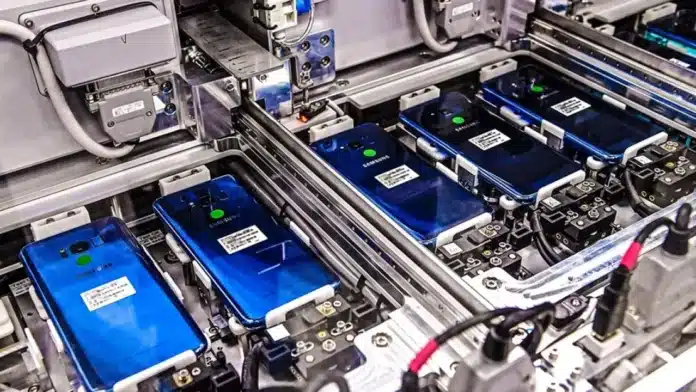Safaricom, a leading telecommunications company, has made an exciting announcement regarding its new venture in Kenya. The company is in the process of setting up a state-of-the-art smartphone factory, which aims to assemble an impressive annual output of 1.2 million to 1.4 million devices. This strategic move positions Safaricom as one of the major players in President William Ruto’s initiative to produce affordable gadgets within Africa.
During a recent session with the National Assembly’s Finance and Planning committee, Safaricom presented a compelling case against the proposed taxation on mobile phones outlined in the Finance Bill of 2023. The telco argued that meeting the target price of a $50 smartphone (equivalent to approximately Sh6,850) would become unattainable due to the increased costs resulting from the proposed taxes. Specifically, Safaricom highlighted that the local assembly cost of smartphones would rise to Sh11,500 if the suggested taxes were implemented.
Mr. Karanja Gichiri, Safaricom’s Head of Venture, passionately addressed Members of Parliament (MPs) during the public hearings on the Finance Bill, emphasizing the crucial need to tackle import, excise, and output Value Added Tax (VAT) to realize the vision of a $50 phone.
“To achieve the President’s vision of a $50 smartphone, we must address the import, excise, and output VAT concerns. This way, we can save Sh4,000 and reduce the cost from Sh11,500 to Sh7,500,” stated Mr. Gichiri.
Safaricom, which currently imports four million phones annually, is actively working on establishing an assembly line. However, the proposed taxes threaten the viability of this project.
“We currently have one local assembly line that has recently been launched. The most costly component of a phone is the microchip that powers the 4G network within the device. We have sourced the appropriate base for a quality phone at a price of $40, primarily driven by the chip and associated components,” Mr. Gichiri explained.
He further elaborated that the assembly process itself, including factory profit margins, would amount to approximately Sh300 per phone. Safaricom aims to pass on these cost benefits to consumers, prioritizing affordability.
Mr. Gichiri also highlighted additional cost factors such as last-mile connectivity, which would require an expenditure of Sh1,400, as well as Sh1,500 for output VAT on the device.
“When considering these factors, the final price of the smartphone reaches Sh11,500, with the manufacturer’s profit margin being only Sh300,” added Mr. Gichiri.
Transportation taxes to the port of Mombasa were also identified as contributors to increased costs. Safaricom revealed that for a phone priced at Sh5,000, the company spends an extra Sh2,300 primarily due to import and excise duties.
Mr. Gichiri noted that when President Ruto initially announced the plan to produce locally assembled smartphones priced at Sh5,000, the exchange rate stood at approximately Sh118 to the dollar. However, it has since increased to Sh135.
“Considering the estimated 120 million new subscribers in Africa who will require phones, and leveraging the advantages of the Africa Continental Free Trade Agreement (AfCFTA), we aim to lead in mobile telephony both within Africa and globally,” declared Mr. Gichiri.
In December of the previous year, President Ruto pledged to introduce the most affordable smartphone in Africa by the end of this year, priced at less than Sh5,000. The goal was to ensure that all Kenyans have access to digital platforms for business and government services.
During a meeting with representatives from micro, small, and medium enterprises (MSMEs), President Ruto proposed scaling down taxes to Sh3,000, which would ultimately reduce the final price of the locally assembled smartphone to a range of Sh6,500 to Sh7,000.
In support of Safaricom’s efforts, a consortium comprising telecommunications operators and device manufacturers joined them during their presentation to the committee chaired by Molo MP Kuria Kimani. The consortium fervently urged the Finance Committee to consider implementing a zero percent Value Added Tax (VAT) on locally assembled or manufactured mobile phones.
The consortium further recommended amending the legislation to exempt excise duty from the supply of locally assembled or manufactured phones. Their argument was backed by Job Kabochi, a partner at PricewaterhouseCoopers (PwC), who presented data showing a 13.5 percent decline in imports during the fourth quarter of 2022 due to shortages and inflation.
To address these concerns, the consortium proposed amending the VAT Act and the Excise Duty Act to include a new provision that encompasses the supply of locally assembled and manufactured mobile phones. Additionally, they suggested introducing a new provision within the Excise Duty Act that covers disassembled or unassembled kits for the local assembly or manufacturing of mobile phones. These amendments would foster a more favorable environment for the production of affordable smartphones in Kenya.
With Safaricom’s determined pursuit of manufacturing smartphones domestically and the support of industry stakeholders, the prospect of realizing President Ruto’s vision of accessible and affordable smartphones for all Kenyans is within reach.

